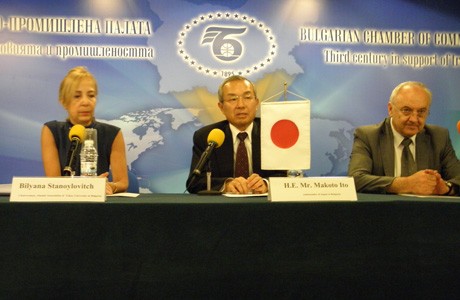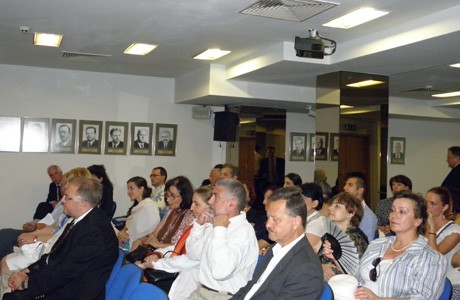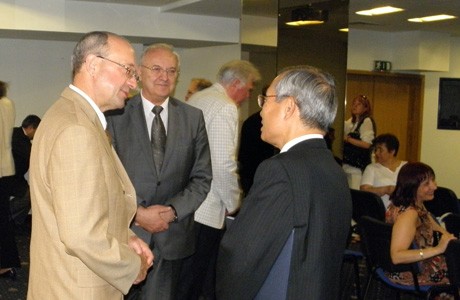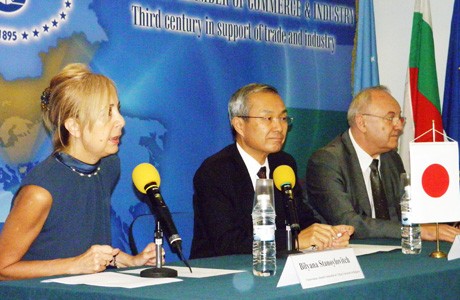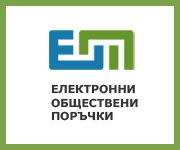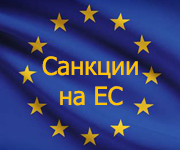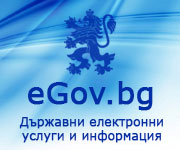Назад
The low taxes, low labour costs and strategic geographic location are insufficient prerequisites for Japanese businessmen to increase their investments in Bulgaria. Among the challenges faced by Japanese companies are the unfinished infrastructure, shortage of qualified personnel, frequent legislative amendments and bureaucracy.
The Bulgarian Chamber of Commerce and Industry hosted the lecture of H.E. Mr. Makoto Ito, Ambassador of Japan to Bulgaria on theme “Economic reconstruction of Japan after the earthquake and Japanese – Bulgarian economic relations”. The event was opened by Mr. Georgi Stoev, Vice-President of BCCI. The participants were welcomed by Mrs. Bilyana Stanoylovitch, Chairwoman of the Alumni Association of Tokay University in Bulgaria.
Successful Japanese investments in Bulgaria should be promoted and exchange between Japanese and Bulgarian businessmen intensified. The upcoming session of the Japanese – Bulgarian Economic Council, which will be accompanied by an investment forum with the participation of the Bulgarian Minister of Economy, Energy and Tourism Mr. Delyan Dobrev will be an excellent opportunity to advertise Bulgaria. Among the successful Japanese investors in our country is Yazaki, which opened a new factory in Sliven. Toshiba is interested in the energy sector and a Japanese company has declared its interest in the field of tunnel construction in Bulgaria. Bulgarian rose oil is successfully exported to Japan as a dietary supplement in a capsule designed in Japan. The capsule improves the physical condition and is an unconventional way of using a traditional Bulgarian product.
H.E. Makoto Ito described the unprecedented damage (approximately EUR 169 million) suffered by Japan as a result of the earthquake that struck the country on 11 March 2011. Japan is working on the restoration of housing and power capacity, the Ambassador of Japan explained. Victims of the earthquake are over 15 000 and the Japanese Government has approved extra budget for reconstruction four times. The restoration works amount to EUR 180 billion. A special agency for reconstruction with a regional focus was established in Japan. The country is working not only to restrore the existing infrastructure, but is also trying to minimize the potential damages in case of a future earthquake of the same magnitude. The reconstruction works take place at different pace in the various regions. They are massive in volume and include clearing of the debris and disinfection of the regions close to Fukushima. The earthquake had an adverse impact on Japanese economy as well, H.E. Makoto Ito said. Some of the distribution channels were destroyed, which affected the industry and production. The yen also rose after the earthquake. Japan’s energy strategy also needs to be revised after the nuclear accident. In 2010 the share of nuclear energy was 26% of the country’s energy balance, and according to initial plans the Government intended nuclear energy to reach 45% of the energy mix of the country by 2030.
After Fukushima, Japan has been revising its main energy plan until – the revised plan is expected to be ready by the end of the summer of 2012. There are several groups of experts, who have taken various stands on the share of nuclear energy in the country’s energy balance. According to some of them, by 2030 Japan must reduce the share of nuclear energy. In 2010 renewable energy in Japan constituted 11% of the country’s energy mix and the goal of the Government is to reach about 25-35%. To achieve its new goals, Japan must increase the percentage of wind and solar energy.
H.E. Makoto Ito gave a lecture on the economic relations between Japan and the EU. He stressed the benefits of the Economic Cooperation Agreement between the EU and Japan, which is under negotiation. Among them are tax incentives and intensifying trade between Japan and the European Union. As a EU Member State, Bulgaria will also benefit from the signing of the economic cooperation agreement. For example, incentives will be available for Bulgaria for the exports of wine to Japan. According to the Ambassador of Japan to our country, trade between Bulgaria and Japan is unsatisfactory. He pointed out that the advantages of Bulgaria as a business partner are not well promoted and mentioned about his proposal the advantages of Bulgaria to be advertised by a special unit of the Japanese Ministry of Economy.
Назад
Economic reconstruction of Japan after the earthquake and Japanese - Bulgarian economic relations
Successful Japanese investments in Bulgaria should be promoted and the exchange between Japanese and Bulgarian businessmen enhanced
The low taxes, low labour costs and strategic geographic location are insufficient prerequisites for Japanese businessmen to increase their investments in Bulgaria. Among the challenges faced by Japanese companies are the unfinished infrastructure, shortage of qualified personnel, frequent legislative amendments and bureaucracy.
The Bulgarian Chamber of Commerce and Industry hosted the lecture of H.E. Mr. Makoto Ito, Ambassador of Japan to Bulgaria on theme “Economic reconstruction of Japan after the earthquake and Japanese – Bulgarian economic relations”. The event was opened by Mr. Georgi Stoev, Vice-President of BCCI. The participants were welcomed by Mrs. Bilyana Stanoylovitch, Chairwoman of the Alumni Association of Tokay University in Bulgaria.
Successful Japanese investments in Bulgaria should be promoted and exchange between Japanese and Bulgarian businessmen intensified. The upcoming session of the Japanese – Bulgarian Economic Council, which will be accompanied by an investment forum with the participation of the Bulgarian Minister of Economy, Energy and Tourism Mr. Delyan Dobrev will be an excellent opportunity to advertise Bulgaria. Among the successful Japanese investors in our country is Yazaki, which opened a new factory in Sliven. Toshiba is interested in the energy sector and a Japanese company has declared its interest in the field of tunnel construction in Bulgaria. Bulgarian rose oil is successfully exported to Japan as a dietary supplement in a capsule designed in Japan. The capsule improves the physical condition and is an unconventional way of using a traditional Bulgarian product.
H.E. Makoto Ito described the unprecedented damage (approximately EUR 169 million) suffered by Japan as a result of the earthquake that struck the country on 11 March 2011. Japan is working on the restoration of housing and power capacity, the Ambassador of Japan explained. Victims of the earthquake are over 15 000 and the Japanese Government has approved extra budget for reconstruction four times. The restoration works amount to EUR 180 billion. A special agency for reconstruction with a regional focus was established in Japan. The country is working not only to restrore the existing infrastructure, but is also trying to minimize the potential damages in case of a future earthquake of the same magnitude. The reconstruction works take place at different pace in the various regions. They are massive in volume and include clearing of the debris and disinfection of the regions close to Fukushima. The earthquake had an adverse impact on Japanese economy as well, H.E. Makoto Ito said. Some of the distribution channels were destroyed, which affected the industry and production. The yen also rose after the earthquake. Japan’s energy strategy also needs to be revised after the nuclear accident. In 2010 the share of nuclear energy was 26% of the country’s energy balance, and according to initial plans the Government intended nuclear energy to reach 45% of the energy mix of the country by 2030.
After Fukushima, Japan has been revising its main energy plan until – the revised plan is expected to be ready by the end of the summer of 2012. There are several groups of experts, who have taken various stands on the share of nuclear energy in the country’s energy balance. According to some of them, by 2030 Japan must reduce the share of nuclear energy. In 2010 renewable energy in Japan constituted 11% of the country’s energy mix and the goal of the Government is to reach about 25-35%. To achieve its new goals, Japan must increase the percentage of wind and solar energy.
H.E. Makoto Ito gave a lecture on the economic relations between Japan and the EU. He stressed the benefits of the Economic Cooperation Agreement between the EU and Japan, which is under negotiation. Among them are tax incentives and intensifying trade between Japan and the European Union. As a EU Member State, Bulgaria will also benefit from the signing of the economic cooperation agreement. For example, incentives will be available for Bulgaria for the exports of wine to Japan. According to the Ambassador of Japan to our country, trade between Bulgaria and Japan is unsatisfactory. He pointed out that the advantages of Bulgaria as a business partner are not well promoted and mentioned about his proposal the advantages of Bulgaria to be advertised by a special unit of the Japanese Ministry of Economy.
19.06.2012
Още новини:
-
18-06-2012
-
15-06-2012

 1 USD =
1 USD =  1 GBP =
1 GBP =  1 CHF =
1 CHF =  ISO 9001:2015
ISO 9001:2015